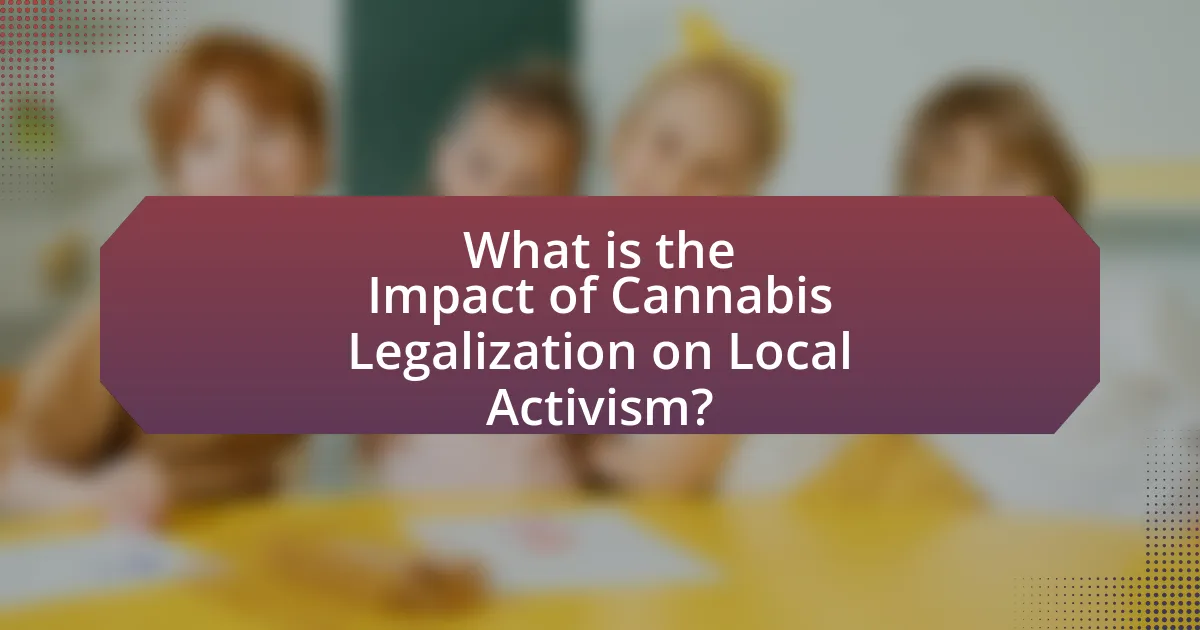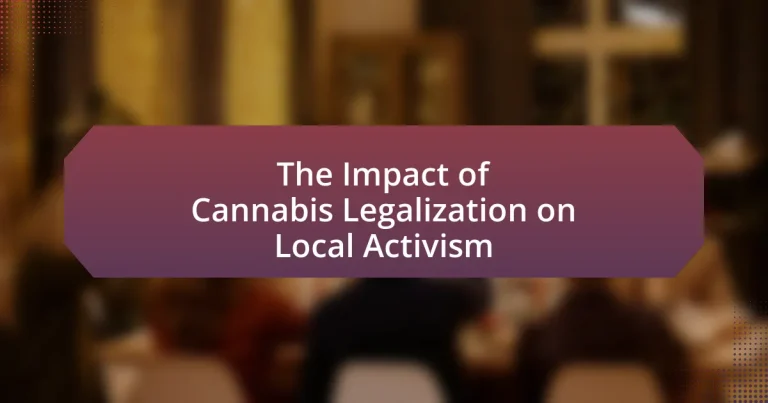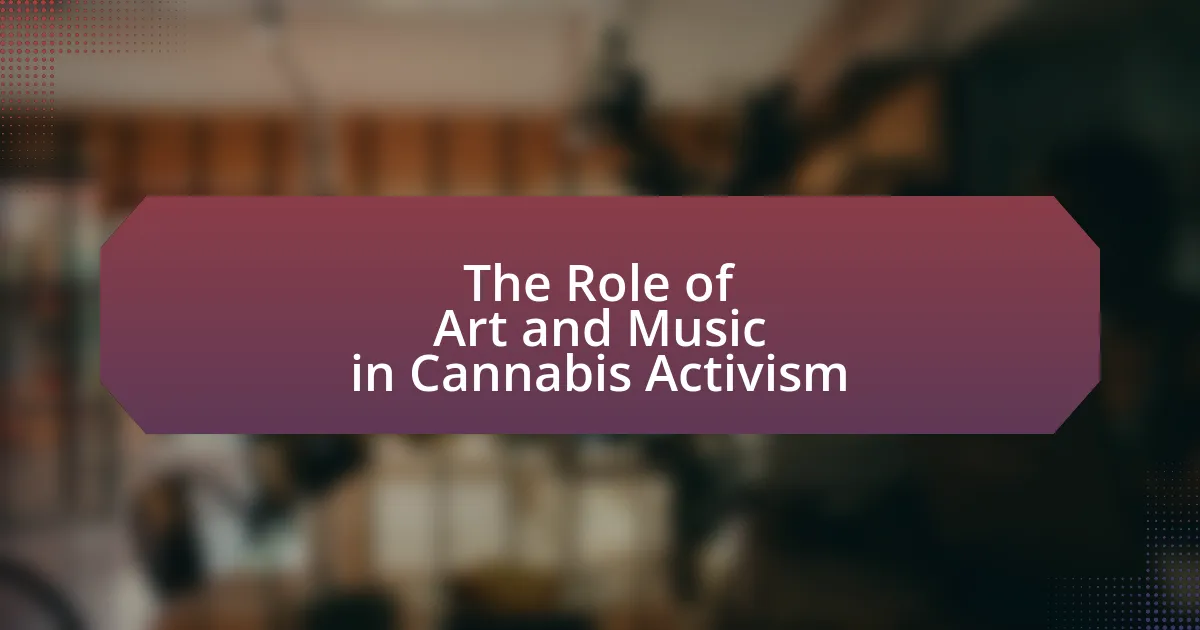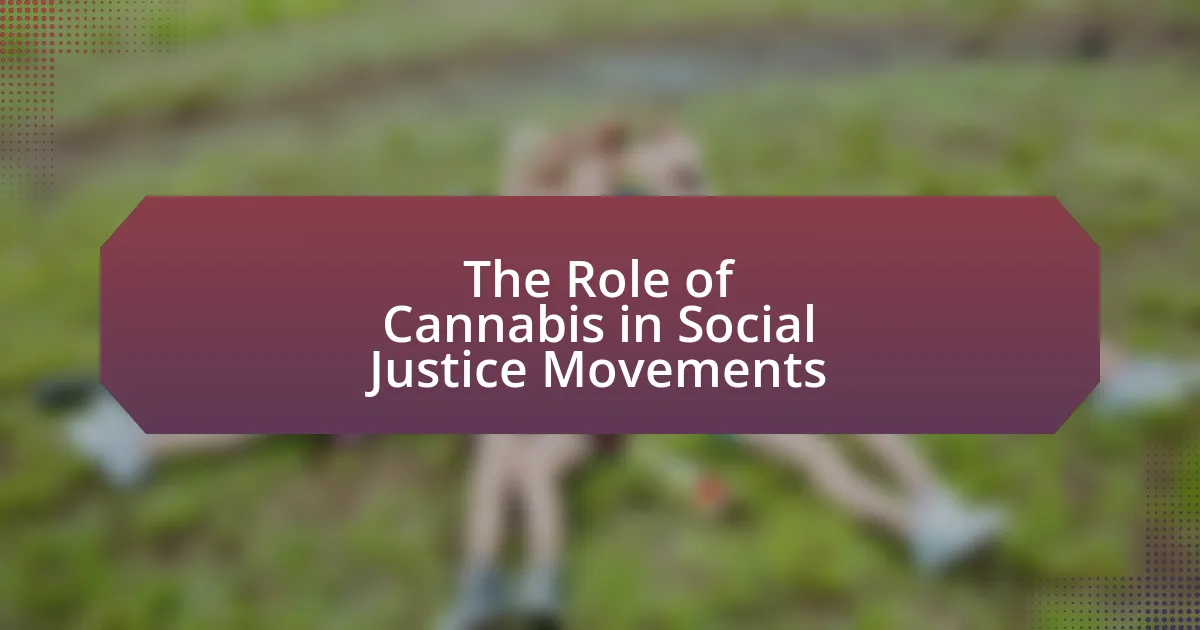The article examines the impact of cannabis legalization on local activism, highlighting how it mobilizes communities around social justice, economic opportunities, and public health issues. It discusses the rise in community engagement and grassroots movements that advocate for equitable policies, such as expunging past cannabis offenses and supporting minority-owned businesses in the cannabis industry. The article also explores the role of local organizations in shaping public perception and influencing policy changes, as well as the challenges activists face, including regulatory hurdles and community opposition. Additionally, it addresses the connections between cannabis legalization and racial equity, emphasizing the importance of local activism in promoting social justice and community reinvestment initiatives.

What is the Impact of Cannabis Legalization on Local Activism?
Cannabis legalization significantly enhances local activism by mobilizing communities around issues of social justice, economic opportunity, and public health. Activists often leverage legalization to advocate for equitable policies, such as expunging criminal records for past cannabis offenses, which addresses historical injustices. For instance, in states like California, local organizations have successfully campaigned for measures that prioritize minority-owned businesses in the cannabis industry, reflecting a shift in community engagement and empowerment. Furthermore, legalization fosters collaboration among various stakeholders, including local governments, businesses, and advocacy groups, leading to increased public discourse and participation in policy-making processes. This dynamic illustrates how cannabis legalization serves as a catalyst for broader civic engagement and activism at the local level.
How has cannabis legalization influenced local community engagement?
Cannabis legalization has significantly increased local community engagement by fostering new avenues for civic participation and dialogue. As communities navigate the implications of legalization, residents often become more involved in local governance, attending town hall meetings and participating in discussions about regulations and zoning laws related to cannabis businesses. For instance, a study by the National Conference of State Legislatures found that states with legalized cannabis saw a rise in community forums and public hearings, where citizens actively voiced their opinions and concerns. This engagement not only enhances democratic processes but also strengthens community ties as residents collaborate on shared interests and initiatives related to cannabis policy.
What are the key factors driving local activism post-legalization?
Key factors driving local activism post-legalization include community engagement, economic opportunities, and social justice initiatives. Community engagement fosters grassroots movements as residents advocate for local regulations and policies that reflect their values. Economic opportunities arise from the cannabis industry, leading to job creation and local business support, which motivates activists to push for equitable access and benefits. Social justice initiatives focus on addressing the historical injustices of cannabis prohibition, prompting activists to campaign for expungement of criminal records and equitable distribution of resources. These factors collectively enhance local activism by aligning community interests with the evolving cannabis landscape.
How do local activists respond to changes in cannabis laws?
Local activists respond to changes in cannabis laws by mobilizing community support, advocating for equitable policies, and addressing public health concerns. For instance, when states legalize cannabis, activists often organize educational campaigns to inform the public about the implications of these laws, such as potential health benefits and risks. Additionally, they may lobby for regulations that ensure fair access to cannabis for marginalized communities, reflecting the findings of studies that highlight disparities in cannabis-related arrests and economic opportunities. Activists also engage in public demonstrations and forums to voice their opinions and influence lawmakers, as seen in various states where grassroots movements have successfully shaped cannabis legislation.
What role do local organizations play in cannabis activism?
Local organizations play a crucial role in cannabis activism by mobilizing community support, educating the public, and influencing policy changes. These organizations often serve as grassroots advocates, providing resources and platforms for individuals to engage in activism. For instance, local groups have been instrumental in organizing campaigns that led to the legalization of cannabis in various states, demonstrating their effectiveness in shaping public opinion and legislative outcomes. Research indicates that community-based organizations can significantly enhance civic engagement, as seen in the successful initiatives in states like California and Colorado, where local activism directly contributed to policy reforms.
How do grassroots movements emerge in response to cannabis legalization?
Grassroots movements emerge in response to cannabis legalization primarily as a reaction to the social, economic, and legal changes that accompany such reforms. These movements often form when communities seek to address issues like social justice, economic opportunity, and public health that arise from the legalization process. For instance, the legalization of cannabis can highlight disparities in enforcement and access, prompting local activists to organize for equitable policies and community benefits.
Evidence of this can be seen in states like California, where the legalization of cannabis in 2016 led to the formation of groups advocating for the expungement of past cannabis-related convictions, reflecting a broader push for social equity. Additionally, research from the Drug Policy Alliance indicates that grassroots organizations often mobilize to ensure that marginalized communities benefit from the new cannabis market, demonstrating a direct link between legalization and the emergence of local activism focused on equity and justice.
What strategies do local organizations use to mobilize support?
Local organizations mobilize support through community engagement, advocacy campaigns, and coalition-building. Community engagement involves organizing events, workshops, and forums to educate the public about cannabis legalization and its benefits, fostering a sense of belonging and shared purpose. Advocacy campaigns utilize social media, petitions, and public demonstrations to raise awareness and influence policymakers, effectively amplifying their message. Coalition-building brings together diverse stakeholders, including businesses, activists, and local leaders, to create a united front that enhances credibility and resource sharing. These strategies have been shown to increase participation and support, as evidenced by successful initiatives in states like California and Colorado, where local organizations played pivotal roles in shaping public opinion and policy regarding cannabis.
Why is local activism important in the context of cannabis legalization?
Local activism is crucial in the context of cannabis legalization because it directly influences policy changes and community acceptance. Grassroots movements often mobilize public support, educate citizens about the benefits and risks of legalization, and advocate for equitable regulations that reflect local values. For instance, in states like California, local activists played a significant role in shaping Proposition 64, which legalized recreational cannabis, by addressing community concerns and ensuring that the legislation included provisions for social equity. This demonstrates that local activism not only drives legislative progress but also ensures that the voices of diverse community members are heard and considered in the legalization process.
How does local activism shape public perception of cannabis?
Local activism significantly shapes public perception of cannabis by fostering community engagement and education around its benefits and risks. Activists often organize events, distribute informational materials, and engage in discussions that highlight personal stories and scientific research, which can counteract negative stereotypes and misinformation. For instance, studies have shown that communities with active cannabis advocacy groups tend to have more favorable views on legalization, as seen in states like Colorado, where local campaigns contributed to a 55% approval rate for legalization in 2012. This grassroots approach not only informs the public but also influences policymakers, creating a feedback loop that further normalizes cannabis use and acceptance within society.
What impact does local activism have on policy changes?
Local activism significantly influences policy changes by mobilizing community support and raising awareness about specific issues. For instance, grassroots movements advocating for cannabis legalization have successfully led to legislative reforms in various states, such as California and Colorado, where local campaigns directly contributed to the passage of legalization measures. Research indicates that local activism can create a feedback loop, where increased public engagement and advocacy pressure compel policymakers to respond to constituents’ demands, thereby facilitating changes in laws and regulations.
How does cannabis legalization affect social justice movements?
Cannabis legalization positively impacts social justice movements by addressing systemic inequalities and reducing incarceration rates for drug-related offenses. Legalization often leads to the expungement of criminal records for individuals previously convicted of cannabis-related crimes, which disproportionately affects marginalized communities. For instance, a report from the American Civil Liberties Union (ACLU) highlights that Black individuals are nearly four times more likely to be arrested for cannabis possession than white individuals, despite similar usage rates. By legalizing cannabis, states can mitigate these disparities, promote economic opportunities through the cannabis industry, and foster community reinvestment initiatives aimed at supporting those harmed by previous drug policies.
What connections exist between cannabis legalization and racial equity?
Cannabis legalization is closely connected to racial equity as it addresses the disproportionate impact of drug enforcement on communities of color. Historical data shows that Black individuals are arrested for cannabis-related offenses at rates significantly higher than white individuals, despite similar usage rates. For instance, a 2020 report from the American Civil Liberties Union indicated that Black people are 3.64 times more likely to be arrested for cannabis possession than white people. Legalization efforts often include provisions for expunging past cannabis convictions, which can help rectify some of the systemic injustices faced by marginalized communities. Additionally, equitable access to the legal cannabis market is increasingly recognized as essential for promoting economic opportunities in these communities, further linking cannabis policy reform to racial equity initiatives.
How do local activists address historical injustices related to cannabis laws?
Local activists address historical injustices related to cannabis laws by advocating for policy reforms that rectify past harms, such as expunging criminal records for those convicted of cannabis-related offenses. These activists often highlight the disproportionate impact of cannabis prohibition on marginalized communities, using data that shows Black individuals are arrested for cannabis offenses at rates significantly higher than white individuals, despite similar usage rates. Additionally, local activists engage in community education and outreach programs to raise awareness about the historical context of cannabis laws and promote equitable access to the legal cannabis market, ensuring that those most affected by past injustices can benefit from legalization.
What challenges do local activists face in the wake of cannabis legalization?
Local activists face significant challenges in the wake of cannabis legalization, primarily including regulatory hurdles, community opposition, and resource limitations. Regulatory hurdles arise as activists navigate complex local laws and zoning regulations that can restrict cannabis-related activities. Community opposition often stems from lingering stigma associated with cannabis use, leading to resistance from residents who may not support legalization efforts. Additionally, resource limitations hinder activists’ ability to effectively organize, advocate, and educate the public, as many rely on limited funding and volunteer support. These challenges collectively impede the progress of local activism in promoting equitable cannabis policies and community engagement.
How do legal and regulatory hurdles impact local activism?
Legal and regulatory hurdles significantly impede local activism by restricting the ability of community members to organize and advocate for change. These obstacles can include stringent laws governing public demonstrations, zoning regulations that limit where activism can occur, and bureaucratic processes that delay or deny permits for events. For instance, in many jurisdictions, activists face challenges in obtaining permits for protests or public gatherings, which can stifle their ability to mobilize support and raise awareness about issues such as cannabis legalization. Additionally, regulatory frameworks may impose penalties for non-compliance, further discouraging grassroots efforts. Research indicates that areas with more restrictive legal environments often see lower levels of civic engagement and activism, as individuals may feel disempowered or fearful of legal repercussions.
What are the common misconceptions about cannabis activism?
Common misconceptions about cannabis activism include the belief that it is solely driven by recreational users seeking to legalize personal use, and that activists are primarily motivated by profit rather than social justice. In reality, cannabis activism encompasses a broad spectrum of issues, including criminal justice reform, public health, and economic equity. For instance, studies show that many activists advocate for the expungement of criminal records related to cannabis offenses, highlighting a commitment to addressing past injustices rather than merely promoting recreational use. Additionally, research indicates that cannabis legalization can lead to significant tax revenue, which activists often argue should be reinvested into communities disproportionately affected by drug enforcement policies.
How can local communities effectively engage in cannabis activism?
Local communities can effectively engage in cannabis activism by organizing educational events and advocacy campaigns that raise awareness about the benefits and challenges of cannabis legalization. These initiatives can include town hall meetings, workshops, and informational sessions that provide accurate information about cannabis laws, health implications, and economic opportunities. Research indicates that communities that actively participate in discussions and mobilize grassroots efforts are more likely to influence local policies and regulations. For example, a study by the Drug Policy Alliance highlights that community-led campaigns have successfully shaped cannabis legislation in various states, demonstrating the power of local activism in effecting change.
What best practices can local activists adopt to enhance their impact?
Local activists can enhance their impact by building strong coalitions with diverse community groups. Collaborating with various organizations increases resources, amplifies voices, and fosters a unified approach to advocacy. For instance, the 2018 legalization of cannabis in Canada saw local activists successfully partner with health organizations and social justice groups, leading to comprehensive public education campaigns that addressed both health and equity issues. This coalition-building not only strengthened their message but also attracted broader public support, demonstrating that collective efforts can lead to more significant policy changes.
How can community members educate themselves about cannabis issues?
Community members can educate themselves about cannabis issues by accessing reliable resources such as educational websites, local workshops, and community forums. These platforms often provide evidence-based information on the legal, health, and social implications of cannabis use and legalization. For instance, organizations like the National Organization for the Reform of Marijuana Laws (NORML) offer comprehensive guides and updates on cannabis legislation, while local health departments may host informational sessions that address community-specific concerns. Engaging with these resources enables individuals to stay informed and participate actively in discussions surrounding cannabis policies and their impacts on local activism.





